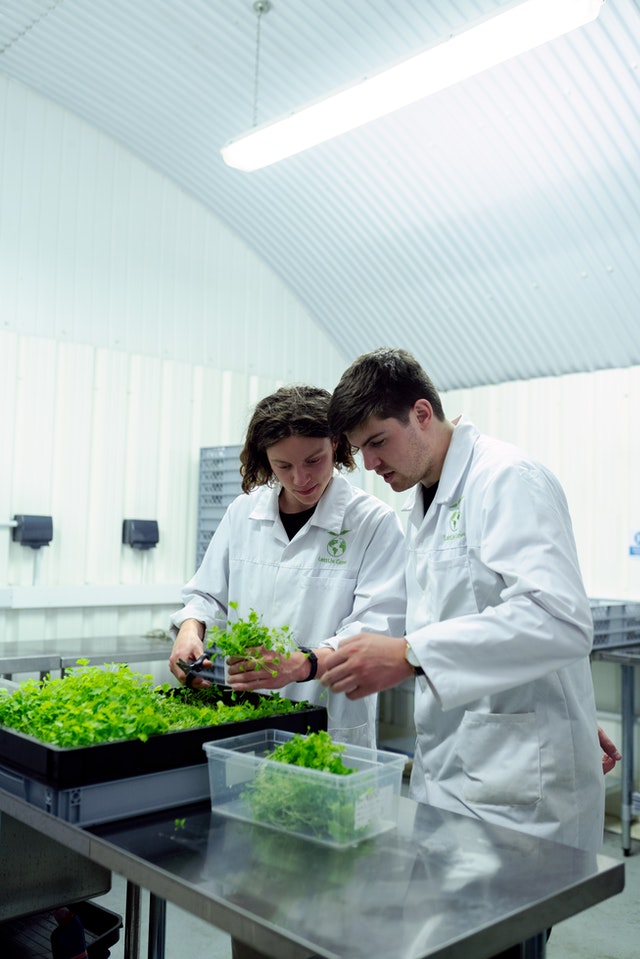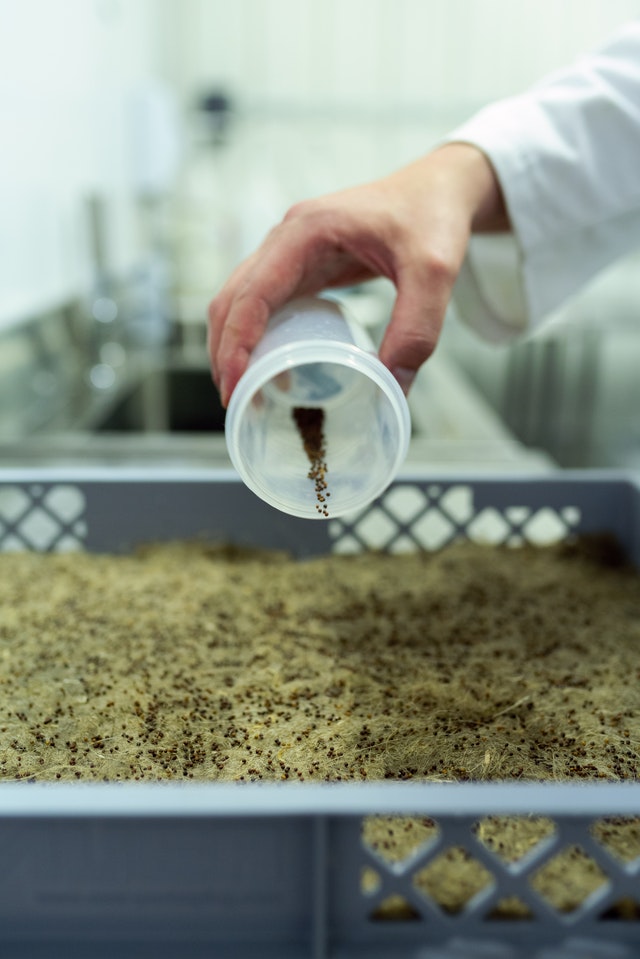Research & Development

In Indian farming community, more than 85% farmers are small and marginal (120 million) having less than 2 ha covering 55% of total cultivable land. The large farmer which having more than 4 ha are only 4% farmer but having about 45% of total cultivable land.
We have to developed the technologies which are low cost. It should be adoptable to farmers that can produce high yield per unit area and also saved the natural resources and environment.
Now days, the drones are popular in spraying of pesticides or herbicides in India but it should be variable rate applicator that would identify the spot area to be sprayed it should not spray uniformly in the field.
Irrigation facility should be created to each field and precise irrigation method should be popularized among the farmer field to reduce the irrigation water losses and increase water application use efficiency. The fertilizer use efficiency can also be increased through introduction of fertigation method used in pressurized irrigation system. Moisture sensor-based irrigation system should be encouraged to enhance the irrigation efficiency as automation in irrigation are being successfully used in European countries as Israel, Japan, Germany etc.
In Indian farming, the fertilizer use efficiency is very less as 30-35, 20-25 and 18-20% in N, P and K, respectively through use of granular fertilizer. These losses ultimately is contaminating the underground water and emission of nitrogenous gas is adding to the atmosphere which is increasing global warming. The efficient fertigation method should be adopted to enhance the fertilizer use efficiency, it may be latest technology as liquid fertilizer use, nano technology etc. The technology in which nano formulation of fertilizer should apply in field in which amount of fertilizer would release whenever it requires to the plant through bio sensors or nano granular form of fertilizer. It means, there is no losses of fertilizer and risk of pollution to environment and only those amount of fertilizers to be used which are needed to plants. In India, the highest fertilizer consumption rate is about 175 kg/ha as compared to China which is about 65 kg/ha but higher productivity per unit area.
That higher rate of fertilizer application is creating problem to become unhealthy soil and pollution in environment. The technologies which are safe, time demanding and environmentally friendly should be introduced for increasing productivity, profitability and livelihood security of farmers.Hence, high yield variety of crops should be developed or adopted as per climatic condition and soil type.
We have to developed the technologies which are low cost. It should be adoptable to farmers that can produce high yield per unit area and also saved the natural resources and environment.
Now days, the drones are popular in spraying of pesticides or herbicides in India but it should be variable rate applicator that would identify the spot area to be sprayed it should not spray uniformly in the field.
Irrigation facility should be created to each field and precise irrigation method should be popularized among the farmer field to reduce the irrigation water losses and increase water application use efficiency. The fertilizer use efficiency can also be increased through introduction of fertigation method used in pressurized irrigation system. Moisture sensor-based irrigation system should be encouraged to enhance the irrigation efficiency as automation in irrigation are being successfully used in European countries as Israel, Japan, Germany etc.
In Indian farming, the fertilizer use efficiency is very less as 30-35, 20-25 and 18-20% in N, P and K, respectively through use of granular fertilizer. These losses ultimately is contaminating the underground water and emission of nitrogenous gas is adding to the atmosphere which is increasing global warming. The efficient fertigation method should be adopted to enhance the fertilizer use efficiency, it may be latest technology as liquid fertilizer use, nano technology etc. The technology in which nano formulation of fertilizer should apply in field in which amount of fertilizer would release whenever it requires to the plant through bio sensors or nano granular form of fertilizer. It means, there is no losses of fertilizer and risk of pollution to environment and only those amount of fertilizers to be used which are needed to plants. In India, the highest fertilizer consumption rate is about 175 kg/ha as compared to China which is about 65 kg/ha but higher productivity per unit area.
That higher rate of fertilizer application is creating problem to become unhealthy soil and pollution in environment. The technologies which are safe, time demanding and environmentally friendly should be introduced for increasing productivity, profitability and livelihood security of farmers.Hence, high yield variety of crops should be developed or adopted as per climatic condition and soil type.
In Indian farmers, the certified seeds and breeder seeds are being used only 30 and 9-10% of farmers and rest 60% of framers are using own seeds which was saved from last year crops for seeding next crops.
Therefore, the quality seed has important role for getting more production per unit area.
Now days, genetically modified (GM) seeds are being used for particulars crops as Bt cotton which save the crops from bollworm insects and it was introduce in 2002 in India and now about 11.5 M ha area of Bt Cotton is being cultivated by farmers of about 95% of total area under cotton. In 2002 approval for the commercial release of Bt cotton hybrids/ varieties resistant to cotton bollworm.
Now, Bt tomato, Bt brinjal and some other crops are being struggling for getting government approval for commercial release to farmers field in the Indian market due to GM crops threaten biodiversity. Many countries in world have banned GM crops due to environmental threat.
Bt Brinjal resistant to brinjal shoot fly developed by M/S Mahyco in collaboration with University of Agricultural Sciences, Dharwad; Tamil Nadu Agricultural University, Coimbatore and ICAR-Indian Institute of Vegetable Research, Varanasi. GM-mustard as Dhara Mustard Hybrid-11 or DMH-11 is a genetically modified variety of mustard developed by the Delhi University’s Centre for Genetic Manipulation of Crop Plants.
Golden rice was developed as GM crop to full fill deficiency of vitamin A. In the current kharif season, farmers would undertake mass sowing of GM seeds for maize, soyabean, mustard brinjal and herbicide tolerant (Ht) cotton, although these are not approved.
Therefore, locally available geno type should hydride to develop high variety which would be suitable for local climate and soil type.
Therefore, the quality seed has important role for getting more production per unit area.
Now days, genetically modified (GM) seeds are being used for particulars crops as Bt cotton which save the crops from bollworm insects and it was introduce in 2002 in India and now about 11.5 M ha area of Bt Cotton is being cultivated by farmers of about 95% of total area under cotton. In 2002 approval for the commercial release of Bt cotton hybrids/ varieties resistant to cotton bollworm.
Now, Bt tomato, Bt brinjal and some other crops are being struggling for getting government approval for commercial release to farmers field in the Indian market due to GM crops threaten biodiversity. Many countries in world have banned GM crops due to environmental threat.
Bt Brinjal resistant to brinjal shoot fly developed by M/S Mahyco in collaboration with University of Agricultural Sciences, Dharwad; Tamil Nadu Agricultural University, Coimbatore and ICAR-Indian Institute of Vegetable Research, Varanasi. GM-mustard as Dhara Mustard Hybrid-11 or DMH-11 is a genetically modified variety of mustard developed by the Delhi University’s Centre for Genetic Manipulation of Crop Plants.
Golden rice was developed as GM crop to full fill deficiency of vitamin A. In the current kharif season, farmers would undertake mass sowing of GM seeds for maize, soyabean, mustard brinjal and herbicide tolerant (Ht) cotton, although these are not approved.
Therefore, locally available geno type should hydride to develop high variety which would be suitable for local climate and soil type.

